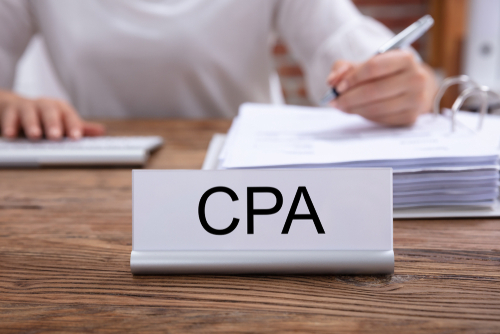 It’s often said that all CPAs are accountants but all accountants are not CPAs. This leaves many aspiring accountants asking, “How Do I Become a CPA?” Becoming a CPA (certified public accountant) can be a very rewarding experience in a person’s career. But it also requires a lot of education and work experience. Accountants often find a whole new horizon out there in terms of employment options once they’ve become CPAs. Here is the path towards becoming a CPA.
It’s often said that all CPAs are accountants but all accountants are not CPAs. This leaves many aspiring accountants asking, “How Do I Become a CPA?” Becoming a CPA (certified public accountant) can be a very rewarding experience in a person’s career. But it also requires a lot of education and work experience. Accountants often find a whole new horizon out there in terms of employment options once they’ve become CPAs. Here is the path towards becoming a CPA. How to Become a CPA
Although many candidates become accountants by earning a bachelor’s degree in accounting or a similar field, a certified public accountant usually has a master’s degree. This is not so much for the purpose of having an advanced degree as it is in having the required amount of credits. Accountants are required to complete 150 semester hours of college courses before they can become CPAs. Since most bachelor degree programs total 120 credits, the candidate must complete an additional 30 semester hours. Some colleges offer a five-year bachelor’s/master’s degree combo program that meets the 150-hour stipulation. Students in a bachelor’s degree accounting program complete courses in:- auditing
- accounting information systems
- managerial accounting
- economics
- taxes
- finance
- project management
- cost accounting
CPA Exam
The CPA exam is administered through the American Institute of Certified Public Accountants. It’s a four-part examination. All parts of the exam do not need to be taken at the same time, but they must all be completed within 18 months of when the first test was taken and passed. There are four testing windows in which the exam can be taken, and it must be taken during one of those times. Candidates are allowed four hours to take each part of the exam and must get a score of at least 75 on each part. The exam tests candidates in four areas:- Auditing and attestation
- Business environment and concepts
- Regulation
- Financial accounting and reporting
Career Outlook for CPAs
Accounting overall is expected to see employment growth of 10 percent between 2016 and 2026 as reported by the U.S. Bureau of Labor Statistics. There should be about 139,900 new accountant jobs by 2026 based on that growth. As of May 2017, accountants earned annual wages ranging from $43,020 to $122,220 with their average annual wage at $77,920. Accountants who have gone the extra mile and become CPAs typically find more career opportunities and higher wages because of the value of having the CPA credential. Candidates who enjoy crunching numbers and doing a lot of math often find CPA work to be very rewarding as well as lucrative. Despite extra education and exams, many accountants choose to become CPAs. Why? Because earning this credential has proven to be much more than just having the three letters behind their names, especially in terms of job security. Related Resources:
How Do I Become a CPA?
Ready to find the perfect college degree?
Best Degree Programs is an advertising-supported site. Featured or trusted partner programs and all school search, finder, or match results are for schools that compensate us. This compensation does not influence our school rankings, resource guides, or other editorially-independent information published on this site.

Brenda Rufener
Author
Julie McCaulley
Expert
Carrie Sealey-Morris
Editor-in-Chief
Ready to find the perfect college degree?
Best Degree Programs is an advertising-supported site. Featured or trusted partner programs and all school search, finder, or match results are for schools that compensate us. This compensation does not influence our school rankings, resource guides, or other editorially-independent information published on this site.